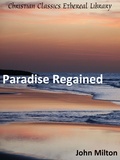John Milton
English poet
Biography
Milton was born in London on December 9, 1608, into a middle-class family. He was educated at St. Paul's School, then at Christ's College, Cambridge, where he began to write poetry in Latin, Italian, and English and prepared to enter the clergy. After university, however, he abandoned his plans to join the priesthood and spent the next six years in his father's country home in Buckinghamshire, reading extensively in the classics and writingOn the Morning of Christ's Nativity (1629), On Shakespeare (1630), L'Allegro and Il Penseroso (1631), and Lycidas (1637). Milton traveled in France and Italy during this time and met Galileo Galilei, who appears in Milton's tract against censorship, Areopagitica. In 1642, he married Mary Powell; even though they were estranged for most of their marriage, she bore him three daughters and a son before her death in 1652.
During the English Civil War, Milton championed the cause of the Puritans and Oliver Cromwell, writing a series of pamphlets on divorce, the freedom of the press, and support for the regicides. He also served as secretary for foreign languages in Cromwell's government. During this time, Milton was steadily losing his eyesight, going completely blind in 1651, but he continued his duties with the aid of Andrew Marvell and other assistants. After the Restoration of Charles II to the throne in 1660, Milton was arrested as a defender of the Commonwealth, fined, and soon released. He lived the rest of his life in seclusion in the country, completing the epic poem Paradise Lost (1667) and writing Paradise Regained (1671) and Samson Agonistes (1671).
Paradise Lost, which chronicles the fall of Adam and his expulsion from Eden, is widely regarded as his masterpiece and one of the greatest epic poems in world literature. The poem had wide-reaching effect, inspiring Alexander Pope's The Rape of the Lock and John Keats' Endymion and deeply influencing Percy Shelley and William Blake. Milton died on November 8, 1674, in Buckinghamshire, England.

